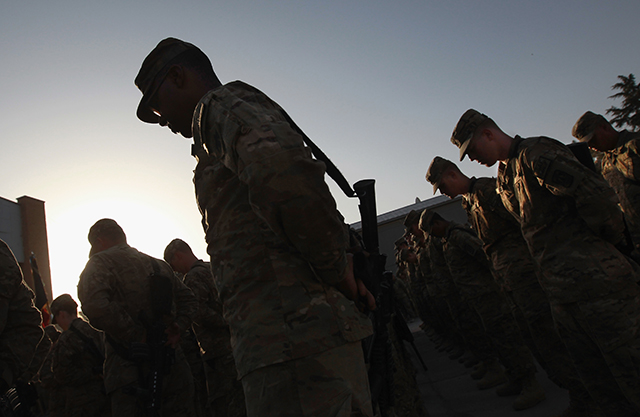It’s easy for conservatives, who are forced to spend much of their time these days opposing bad ideas, to neglect the great responsibility of advancing good ideas.
That was the impetus behind the Feb. 10 Conservative Policy Summit convened at the Heritage Foundation by its political arm, Heritage Action for America.
“It’s not sufficient for conservatives to run against agendas,” Heritage President Jim DeMint said in his opening remarks. “They must advance ideas and legislation that will build a stronger America.”
The first and perhaps the most important thing for conservatives to get right is a wise foreign policy. Only after we ensure we have a sufficiently strong national defense can we turn to the important domestic issues that merit our attention.
That means, for starters, making sure that we have sufficient troop levels to defend ourselves and our allies adequately. Yet continued cuts to the defense budget imperil our ability to do that.
Recent statements by military officials indicate that the Army may soon shrink to its lowest active-duty strength and size since before World War II.
Indeed, all the recent talk of using more unmanned ground and aerial vehicles flows from efforts to make up for expected troop reductions. Do more with less, right?
We’ve been here before (such as prior to World War II), and although we manage to make up for the shortcomings and prevail when serious threats emerge, it always costs more time, treasure and trouble than it would have if we hadn’t cut our forces to begin with.
When it comes to weapons, we need to stop relying on international pacts that are questionable at best. Why, for example, did President Obama agree to a New START treaty that forces us to cut our nuclear weapons to 1,550 by 2018 when the Russians have a track record of violating such accords?
Why stand behind the Comprehensive Test Ban Treaty, a pact that other nations flout with impunity and that allows our arsenal to atrophy through disuse?
Our nuclear “modernization” efforts are anything but. Under current policies, replacement systems won’t enter our arsenal until 2030. By then, the United States will have 60-year-old intercontinental-range ballistic missiles (ICBMs), 40-year-old submarine-launched ballistic missiles, and 35- to 70-year-old bombers.
This needs to change. We should be economical, but trying to defend ourselves on the cheap is no defense at all.
Another crucial item on our defense “to-do” list is one many Americans think we already have; namely, a comprehensive missile defense. We have a rudimentary one in place, but we need one with land, sea, air and space capabilities.
That means locating sensors throughout the world — and above it. It also means increasing the number of interceptors we have to counter long-range missiles. With a layered system, we have a much better chance of destroying an incoming missile.
Originally appeared in the Washington Times.
Such a system can protect us not only against a conventional nuclear attack (launched either deliberately or accidentally), but from an electromagnetic pulse (EMP) — a high-intensity burst of energy from a nuclear warhead exploded above the ground. Its purpose: to cause severe current and voltage surges.
An EMP could fry all electronic devices within a large radius, including all the cellphones and other devices we rely on in our daily lives. It could shut down the entire power grid and transportation systems over a large region of the country. It’s that serious.
When it comes to the war on terrorism, we must maintain a sufficient fighting force in hot spots such as Afghanistan. Pulling out entirely by year’s end would be a huge mistake. We need a robust force there beyond 2014.
If the people there know that the United States will remain engaged for the foreseeable future, it will weaken the hand of terrorist networks who are counting on the U.S. vacating before the situation is stable.
“You ask how to fight an idea,” Messala says in the film “Ben-Hur.” “Well, I’ll tell you how. With another idea.” Conservatives should take heed. Thwarting bad policy is vital, but we can’t stop there, especially when our security is at stake.
Ed Feulner is founder of the Heritage Foundation (heritage.org).
